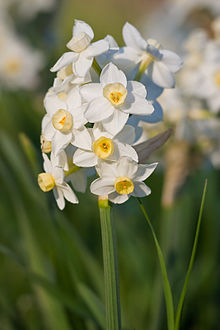The season turned like the page of a glossy fashion magazine.
In the park the daffodils came up
and in the parking lot, the new car models were on parade.Sometimes I think that nothing really changes -The young girls show the latest crop of tummies,
and the new president proves that he's a dummy.
—from "The Change" by Tony Hoagland
Came upon this poem like a doctor's dropsy poster.
In the streets the hot pants glittered
and on the corner pimps color-flagged that ass parade.Sometimes I dress inane in the outrageous.Those young girls call in robbers on their dummies
and when I need a rhyme I turn to mummy.
—from "Shitstrum" by Uche Ogbuji
I'll mention that my "Quotīdiē" quotes generally derive from admiration, but now and then I pick them for more negative reasons, such as: "How does such a god-awful poem even draw enough attention to be controversial? I'm never quite au fait on the poetry scene, but even I heard of the commotion Hoagland's poem made at a recent AWP conference. A "shitstorm" my friend Wendy termed it. I read the poem and wondered whether it was a prank by an idle sophomore. I understand the trend towards plainspoken poetry, though I disagree with it. I think the language of poetry should be special, almost by definition (the language of Williams and Sandburg is much more special than many of their would-be imitators seem to think.) But there is plain speaking and there is random collage of the inane. Hoagland's poem sounds like a found poem from scraps overheard at a grocery store. I myself am not much for plain speaking, whether in poetry or in everyday conversation. I revel in words perhaps too much for my own good, so I couldn't do much justice to that aspect of "The Change" in my parody.
After the extraordinary productivity I enjoyed participating in Heather Fowler's poem-a-day project last June, I decided to pay attention to National Poetry Month this year, to the extent of joining the National Poetry Writing Month (NaPoWriMo) tradition. I considered following prompts, but I couldn't find a prompter of Heather's quality, so I decided to just keep it old school. Read a lot of poems every day and thus shore up inspiration to write. The kick-off, of course, is April Fool's Day, so I re-read a few favorite comic poems and parodies, including Lewis Carroll's "The White Knight's Song" (or "Haddock's Eyes" or "The Aged Aged Man" or "Ways and Means" or "A-Sitting On A Gate").
He said "I look for butterflies
That sleep among the wheat;
I make them into mutton-pies,
And sell them in the street.
I sell them unto men," he said,
"Who sail on stormy seas;
And that's the way I get my bread --
A trifle, if you please." But I was thinking of a plan
To dye one's whiskers green,
And always use so large a fan
That it could not be seen.
So, having no reply to give
To what the old man said,
I cried, "Come, tell me how you live!"
And thumped him on the head.
This delight is a spoof of a Wordsworth poem, and decided me to write my own spoof; "The Change" came to my mind as a poem ripe for the treatment.
and because that cracker
had a fucking Les Paul and a bottle of Jack,
not giving a damnstrumming those wires like he was Andrew Jackson
putting the Sioux crew on the trail of tears
all like "this land is MY land, bitch!" Now and then manifest destiny
asks you to lean in and check whether
it's got something on its teeth
and you could just stretch a bit
and box its epiglottisand I know squat about chess
but that day felt like "Uno, pardners!"
—from "Shitstrum"
Really Hoagland's poem is more of an offense to my literary sense than for its supposed race-baiting. I think it's entirely fair game for a white person to express some ambivalence at how Serena and Venus Williams, the all-but-certain players to whom Hoagland alludes, a pair of girls straight outta Compton like N.W.A., come on to the country club scene of tennis to ruthlessly batter their competition. I find Serena's "to-hell-with-everybody stare" a wonder of sport, but I can see how some would take it as a blunt challenge to their cherished idols. And why should a poet not frankly express such ambivalence? That's why my spoof does not only parody the Hoagland poem, but it also jabs at the responses to the poem. The very first comment on the Weblog where I found the poem posted is as follows:
This is the most offensive poem I have ever read. With respect, TS Eliot's anti-semitism has nothing on the bigotry expressed in this poem.
You would think he'd laced his work with racist terms and judgments, but I think that would be overstating the case. I'd say the closest he came was the contemptuous generalization of "Zulu bangles on her arms" but again why should a poet not be free to express the sorts of deep, tortured thoughts that real people do? If anything, I think he held back. I decided to do somewhat less of that. If folks want something to shock their publicly good-mannered faces, why not do it with some gusto? At first I made the underdog banjo player a black guy, but I figured maybe it was a bit too easy for me as a black guy to take chances with that sort of taboo language. I thought there was more bite to making him Native American, especially as it plays with contrasts of which "tribes" are the underdogs, and what changes when one such tribe finds a champion, looking back not just to the end of the 20th century, but also the end of the 19th, and the pain and injustice that attended that change in the fortunes of the original population.
Writing "Shitstrum" was a ton of fun, and gave me my first NaPoWriMo entry rather painlessly, for which I'm grateful, but I expect that for the rest of the month I'll address my pen towards the glories of poetry, rather than its silly asides. I'd consider myself blessed beyond belief if I can write as Serena plays.













